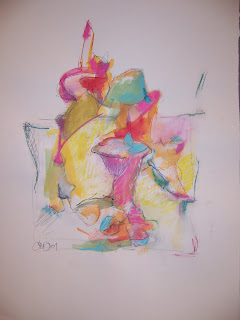The last few weeks have been very productive, and not in a particularly predictable direction. I had been doing a bit of drawing and had been working on one canvas for a while. The drawing helped to reveal some directions that seemed to interest me. The paintings that followed also seemed to develop quickly and were based somewhat on the drawings. Both September's Blush and Middle Ground went on to the canvas with out much struggle, and seemed to be self directed in some sense. There always comes a point where the next step is not easy to see. Then there is a period when everything slows down and the process can become difficult. To change is inevitably to loose something, and replace it with something else. When I look back at the progression of Middle Ground, I like lots of the painting in the early stage, the first image. I have heard painters talk about this, "you can't stop, you have to go on". There are things that will never be exposed without the release of the known, and the pursuit of all that is not known. This is I think, the important thing, to continue to learn and understand through direct experience. We all want to conceptualize things for some reason.
I have been reading about the work of Arshile Gorky, and in the reading I ran across a phrase which I couldn't let go of, "poetic ambiguity". In the context of the work, it refers to providing the reader, or viewer the option to see the resolution in more than one possible way. I have for a long time thought of resolution as the holy grail, and this idea has made me think about what I'm looking for. I still find that I know less about things like direction. I feel excited at the end of a painting for a short time, and then I am overwhelmed by the idea of the next one. I never quite know where to start. Almost everything is based on something that preceded it, or an idea from somewhere. Both Gorky and De Kooning talked about abstraction and the point of their having painted or not painted a single abstract painting in their lives. Gorky seemed to strongly believe that observations of nature could not be eliminated, and in fact may be the language of common ground. I love figurative images but don't know how to combine the figure with this kind of work. More drawing may help, and couldn't hurt.



 These four drawings were all worked together at the same time. One of the things I enjoy doing is setting up little games with rules or limitations by which to work. This was one of those games. I could use only what I found in the classroom that I use for drawing, and I had to work on all four drawings at the same time. I also had to finish them by the end of the day. The thing that I also enjoy is breaking the rules if I need to. I set the rules, so if need be why not break them.
These four drawings were all worked together at the same time. One of the things I enjoy doing is setting up little games with rules or limitations by which to work. This was one of those games. I could use only what I found in the classroom that I use for drawing, and I had to work on all four drawings at the same time. I also had to finish them by the end of the day. The thing that I also enjoy is breaking the rules if I need to. I set the rules, so if need be why not break them.


























